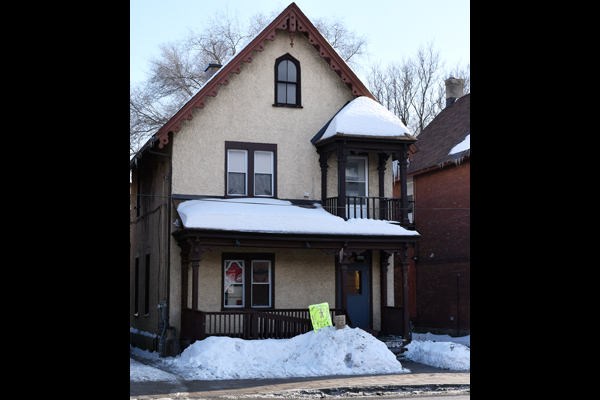Student federation gears resources to soon-to-be-closed homeless shelter
Photo: Remi Yuan
The Student Federation of the University of Ottawa (SFUO) passed an emergency motion at the latest Board of Administration meeting to provide support for the Odawa homeless drop-in centre at 510 Rideau Street.
Also known as 510 Odawa, the centre will close later this month due to funding cuts.
The motion proposed that the SFUO support the centre’s actions to restore its funding, both through means of writing a letter to Ottawa Mayor Jim Watson and Rideau-Vanier Councillor Mathieu Fleury, and via the provision of financial resources to ongoing protests.
A protest to restore funding to the centre took place on Parliament Hill Feb. 25. The SFUO supported the protest, which included supplying hot beverages to the protestors, providing megaphones and other supplies, paying the O-Town Boys—a local indigenous drumming group—to perform, and providing an honorarium to the elder who gave the opening speech and prayer for the rally.
An aboriginal homeless shelter “understands the reality of being indigenous,” along with “the historical context of how someone who’s indigenous ends up on the street,” said vice-president of services and communications Nicole Desnoyers, who introduced the motion.
Desnoyers said the Odawa closure should concern all students, both because of the centre’s proximity to the campus community and neighbourhood, and also because of the SFUO’s ongoing commitment to solidarity with indigenous communities both on and off campus.
She attributes the centre’s funding cuts to a decision by the city responding to complaints from local businesses and condo organizations regarding the number of homeless people in the Rideau-Vanier area.
The 10-year-old centre, run by the Odawa Native Friendship Centre, provides a number of services to those in need, including meals, crisis counselling, and transition services such as referrals to community housing. It will close later this month due to funding cuts.
Mathieu Fleury said the SFUO is mistaken in assigning the blame for 510 Odawa’s closure to the city.
The loss of funding came as a result of changes to the Federal Homelessness Partnership Strategy Program, a federal initiative that provides Ottawa with $10.8 million each year for homelessness support services, according to Fleury.
This past year, the program’s criteria were re-evaluated to place more of a focus on centres that have a housing-first approach. This program is not the only money the city gives to the homelessness sector, but was the main source of funding that 510 Odawa depended on.
Fleury said the city required organizations to re-apply in order to keep getting funding. The application 510 Odawa submitted was rejected because they don’t prioritize housing first, he said.
The list of organizations that will continue to be funded has not yet been released.
Fleury said sufficient services exist in the area to continue supporting aboriginal homelessness initiatives, citing the Wabano Centre for Aboriginal Health, Minwaashin Lodge, and the Inuit Centre as alternatives.
Desnoyers said 510 Odawa’s services are not replaceable.
“A lot of the response you hear from the public is that it’s OK because you have the Mission, the Shepherds (of Good Hope),” she said, but those centres won’t be able to provide the services that 510 Odawa did.
Desnoyers said she believes the centre’s funding cuts reflect a broader trend.
“What we’re seeing over the course of the last five, 10 years is a number of cuts to indigenous initiatives across the country, within this province, and within this city,” she said, citing last summer’s cuts made to the Native Women’s Association of Canada’s campaign to help find the many missing and murdered indigenous women in Canada.
Desnoyers said she plans to continue to involve the SFUO in the campaign to restore the centre’s funding as more initiatives come forward.





